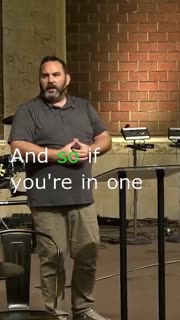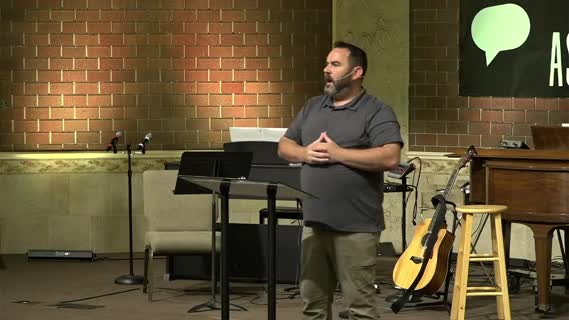The Transformative Power and Necessity of Prayer
Devotional
Sermon Summary
Bible Study Guide
Sermon Clips
### Quotes for Outreach
1. "And I wonder how many of us, like, that's when our prayer life thrives, when situations get desperate. It could be funny. It could be serious, but I wonder how many of us have that view of prayer. Sometimes it's the, you know, in case of emergency, break glass kind of moment for us when prayer really becomes important." [32:42]
2. "And so for the believer, I think sometimes when we look at prayer, and it feels like inaction, right, like it's time wasted, it's time spent not doing anything, and yet God's Word paints a very different picture for us in the importance of prayer." [33:55]
3. "And so Jesus himself is already implying that if you were going to be about this way of life, this following of Jesus, prayer needs to be a part of your priority. He doesn't say if you pray, he doesn't say, if you get around to it. He's like, when you pray, here's how you need to invest in prayer." [36:43]
4. "And so if you're in one of those seasons when you feel like God is so far and distant and you wouldn't even know his face if you saw it, maybe you need to invest in earnestly seeking him in prayer. And not for the sake of supplication, not for the sake of even confession, but just taking a moment in what we would call contemplative prayer. Just seeking the face of the Lord and saying, God, I want to know you. Show yourself to me." [01:00:36]
5. "And so again, if you struggle with knowing God's will and you struggle with doing what he's called you to do, maybe the place to start is prayer. And oftentimes those other things work them out, like, okay, I've got a decision before me. I've got these steps that I've got to work out. I need to see God's face. Well, have you started with prayer? Because if that's his will for you, I believe he's going to continue to show you the rest of his will if you will be obedient in this thing he's called you to do." [01:02:48]
### Quotes for Members
1. "And so here's the idea, church, is that we, as God's people, can be walking around, and we can be honest before God in that private prayer time, and we can have that. We can have that confession be a part of that private prayer life, but if confession is not a part of our corporate prayer life, we're often still going to be walking around wounded. Forgiven, but wounded. And James gives us this path to healing, that we can receive the forgiveness when we pray privately to God, but oftentimes the healing comes when we confess to our brothers and sisters in Christ, and we pray for one another. And we receive that healing that God wants to give us as a means of him working through us. Through his people." [54:22]
2. "And so here's the truth, church. Again, we are never going to be fully united. We are never going to be fully healed, fully functional, fully healthy as a church until we're able to get real with one another about our struggles and confess those to each other and pray for one another and receive the healing that God wants us to have so that we can move forward and continue to build his kingdom. And we'll live in isolation, even if we're around people, when we're not real. And confessing and praying with one another." [56:17]
3. "And so if I can just put in a plug here, man, if you are in a Sunday school group, if you're in a small group, this needs to be a part of the function of your group. That you wouldn't just talk about God in theory and you wouldn't just talk about what we ought to do, but that we could be honest with one another in the areas of our struggle and pray for each other that we can move out of those areas of sin. We need this type of culture in our church pray for one another even in a context, confessional, corporate way." [56:49]
4. "And so again, just in a self-reflection, we have six statements that I think should call us to pray. So if you want to be rewarded, you want to be Christ-like, if you want to be healed, if you want to know God, if you want to change the world and you want to be obedient, we need to be people who pray. If none of those apply to you, maybe you can walk out of here and throw prayer out of the window. But I imagine that most of us see ourselves in most of all of not those statements." [01:03:21]
5. "And so as our band comes up and we worship at the end of our service here, I'm going to ask you guys to do something a little bit different. Because if the word of God, if God calls us this many times to be a people of prayer, I think it would be a missed opportunity if we did not take the time to respond with prayer this morning. And so we have a song prepared, but I'm going to challenge you not to sing this morning as we come to a time of response. As the music plays and our worship team sings over you, I want to call every believer in this room to enter into a time of prayer." [01:04:22]
Ask a question about this sermon
1. "And I wonder how many of us, like, that's when our prayer life thrives, when situations get desperate. It could be funny. It could be serious, but I wonder how many of us have that view of prayer. Sometimes it's the, you know, in case of emergency, break glass kind of moment for us when prayer really becomes important." [32:42]
2. "And so for the believer, I think sometimes when we look at prayer, and it feels like inaction, right, like it's time wasted, it's time spent not doing anything, and yet God's Word paints a very different picture for us in the importance of prayer." [33:55]
3. "And so Jesus himself is already implying that if you were going to be about this way of life, this following of Jesus, prayer needs to be a part of your priority. He doesn't say if you pray, he doesn't say, if you get around to it. He's like, when you pray, here's how you need to invest in prayer." [36:43]
4. "And so if you're in one of those seasons when you feel like God is so far and distant and you wouldn't even know his face if you saw it, maybe you need to invest in earnestly seeking him in prayer. And not for the sake of supplication, not for the sake of even confession, but just taking a moment in what we would call contemplative prayer. Just seeking the face of the Lord and saying, God, I want to know you. Show yourself to me." [01:00:36]
5. "And so again, if you struggle with knowing God's will and you struggle with doing what he's called you to do, maybe the place to start is prayer. And oftentimes those other things work them out, like, okay, I've got a decision before me. I've got these steps that I've got to work out. I need to see God's face. Well, have you started with prayer? Because if that's his will for you, I believe he's going to continue to show you the rest of his will if you will be obedient in this thing he's called you to do." [01:02:48]
### Quotes for Members
1. "And so here's the idea, church, is that we, as God's people, can be walking around, and we can be honest before God in that private prayer time, and we can have that. We can have that confession be a part of that private prayer life, but if confession is not a part of our corporate prayer life, we're often still going to be walking around wounded. Forgiven, but wounded. And James gives us this path to healing, that we can receive the forgiveness when we pray privately to God, but oftentimes the healing comes when we confess to our brothers and sisters in Christ, and we pray for one another. And we receive that healing that God wants to give us as a means of him working through us. Through his people." [54:22]
2. "And so here's the truth, church. Again, we are never going to be fully united. We are never going to be fully healed, fully functional, fully healthy as a church until we're able to get real with one another about our struggles and confess those to each other and pray for one another and receive the healing that God wants us to have so that we can move forward and continue to build his kingdom. And we'll live in isolation, even if we're around people, when we're not real. And confessing and praying with one another." [56:17]
3. "And so if I can just put in a plug here, man, if you are in a Sunday school group, if you're in a small group, this needs to be a part of the function of your group. That you wouldn't just talk about God in theory and you wouldn't just talk about what we ought to do, but that we could be honest with one another in the areas of our struggle and pray for each other that we can move out of those areas of sin. We need this type of culture in our church pray for one another even in a context, confessional, corporate way." [56:49]
4. "And so again, just in a self-reflection, we have six statements that I think should call us to pray. So if you want to be rewarded, you want to be Christ-like, if you want to be healed, if you want to know God, if you want to change the world and you want to be obedient, we need to be people who pray. If none of those apply to you, maybe you can walk out of here and throw prayer out of the window. But I imagine that most of us see ourselves in most of all of not those statements." [01:03:21]
5. "And so as our band comes up and we worship at the end of our service here, I'm going to ask you guys to do something a little bit different. Because if the word of God, if God calls us this many times to be a people of prayer, I think it would be a missed opportunity if we did not take the time to respond with prayer this morning. And so we have a song prepared, but I'm going to challenge you not to sing this morning as we come to a time of response. As the music plays and our worship team sings over you, I want to call every believer in this room to enter into a time of prayer." [01:04:22]






























